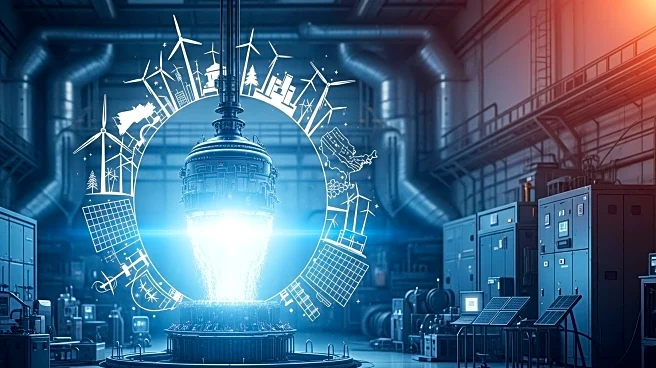What's Happening?
Commonwealth Fusion Systems (CFS), a U.S.-based private fusion company, has entered into a power purchase agreement with Italy's energy major Eni. The agreement, valued at over $1 billion, involves Eni purchasing power from CFS's 400 MW ARC fusion power plant located in Chesterfield County, Virginia. This plant is expected to connect to the grid in the early 2030s. CFS, a spinout from MIT's Plasma Science and Fusion Center, is focused on developing magnetic confinement fusion technology. The deal with Eni marks the second offtake agreement CFS has secured in recent months, following a similar agreement with Google for 200 MW of clean fusion power. CFS recently raised $863 million in a Series B2 funding round to advance its fusion demonstration machine and power plant development.
Why It's Important?
The agreement between CFS and Eni signifies a major step forward in the commercialization of fusion energy, which is considered a potential solution for zero-emission energy generation. Fusion energy promises clean, almost limitless power, attracting interest from diverse sectors, including traditional energy leaders and tech giants like Google. The successful implementation of fusion technology could revolutionize the U.S. energy landscape, reducing reliance on fossil fuels and contributing to climate change mitigation efforts. The partnership with Eni underscores the growing confidence in fusion energy's viability and its potential to transform energy markets globally.
What's Next?
As CFS progresses towards connecting its fusion power plant to the grid, the company will likely continue to secure additional partnerships and investments to support its development goals. The success of the Virginia plant could pave the way for further fusion projects, influencing energy policy and investment strategies in the U.S. and beyond. Stakeholders in the energy sector, including policymakers and environmental groups, will be closely monitoring the advancements in fusion technology and its integration into the energy grid.
Beyond the Headlines
The development of fusion energy raises important ethical and environmental considerations. While fusion promises clean energy, the technology's implementation must be carefully managed to avoid potential ecological impacts. Additionally, the shift towards fusion energy could disrupt existing energy markets, necessitating adjustments in workforce training and economic planning. The long-term success of fusion energy will depend on balancing technological innovation with sustainable practices.












